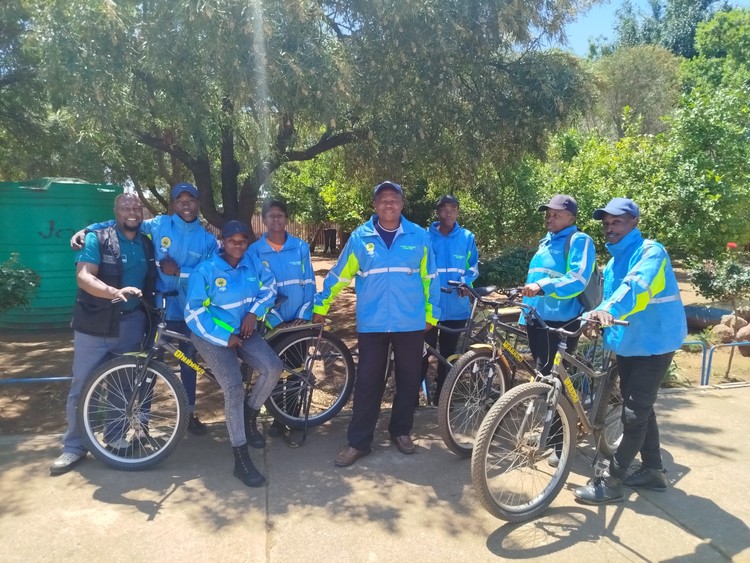
24 November 2025
The community patrollers have become the eyes and ears of an overstretched police force in Johannesburg’s Organge Farm. Photos: Shaun Smillie
An unlikely group of Orange Farm residents — usually identified by their bright blue jackets and bicycles — are taking crime head on in their community.
These community patrollers work alongside the Orange Farm Community Police Forum (CPF).
Orange Farm grew out of the then Transvaal Provincial Administration’s plan in the late 1980s to buy farms to develop a township close to Johannesburg. Since then the area has experienced rapid growth and urbanisation. With this came rising crime.
Orange Farm has one of the highest violent crime rates in Gauteng. For the first three months of 2025, according to latest SAPS statistics, the Orange Farm police station had the third highest number of murders in the province, and there were 54 reported rapes, an increase from 20 in the previous year.
Informal traders in the community are increasingly being targeted by criminals.
Despite the increase in violent crime, community members have lauded efforts by the crime patrollers to make their streets safer, with over 400 members already part of the initiative.
In early November an illegal firearm was uncovered during one of the patrollers’ stop and searches. Other recent roadside frisks confiscated an assortment of knives including pangas, that have become the weapons of choice of criminals terrorising the community. Their drug seizures have also confiscated packets of crystal meth, mandrax pills and nyaope.
There is only one police station that services thousands of households in this vast and high-density area.
“There are a million people living in Orange Farm. You have 11 informal settlements, 45 extensions, 78 plots, 54 farms and only 240 police officers,” explains Orange Farm CPF chairperson Andries Macheli, who works closely with the patrollers.
“The police alone can’t fight crime here; they need the community,” he says.
Macheli believes the main drivers of crime are the high unemployment rate, the proliferation of illegal taverns and growing gang violence.
There are several gangs operating in the Orange Farm area but the two best known are the 50s and 40s. They often fight over territory and prey on residents and informal traders in the area.
Many of the members of these gangs, says Macheli, are recruited from illegal initiation schools. Other young recruits are learners at local schools who come from vulnerable households.
“It was never this bad,” says Abel Sello, who has been a member of the CPF for 15 years.
To cover the vast informal settlements, farms and the urban areas of the township, the patrollers use bicycles and other security gear which have been donated by business and local organisations. At night, the group patrols on foot with a police escort.
On the streets of Orange Farm there are signs that the bicycle patrols are being appreciated. “The community now tells us, rather than going to the police,” says patroller Palesa Mazibuko.
Community outreach officer at the organisation, RADA (Rape Alcohol Drug Abuse), Matome Mokgoloboto, says the organisation is one of their sponsors. The success of the initiative has meant that Mokgoloboto is currently working with other communities across South Africa.
One of them is the newly formed CPF near Tzaneen in Limpopo. “More communities are getting involved because they are realising that this is the way to go,” he says.
Though each community’s policing challenges are different. “They come and tell me their stories,” says Mokgoloboto.
Many of the community patrollers are unemployed, so RADA provides them with food parcels and skills workshops that could help them in finding a job.
One of the patrollers is 28-year-old Ikgopoleng Mofokeng. “I used to just stay at home, but with the CPF I got some papers [training certificates] and I am hoping that this will help me [find a job].”
At the Orange Farm police station, where the CPF and the community patrollers operate from, we saw a group of applicants wanting to join the initiative. Before the new recruits can join, they will go through a screening process and will be fingerprinted to check if they have criminal records. Only then they will go through training.